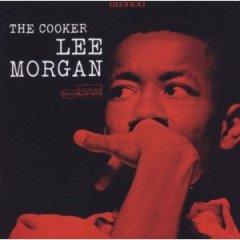Lee Morgan - The Cooker (1957)
Lee Morgan - The Cooker (1957)

01 - A Night In Tunisia 02 - Heavy Dipper 03 - Just One Of Those Things 04 - Lover Man 05 - New-Ma 06 - Just One Of Those Things (Alternate Take) Personnel: Lee Morgan (trumpet); Pepper Adams (baritone saxophone); Bobby Timmons (piano); Paul Chambers (bass instrument); Philly Joe Jones (drum).
Although Lee Morgan had already made a handful of albums at the age of 19, The Cooker (1957) represents his throwing down the gauntlet as successor to Clifford Brown's vacated throne. It's close to being a pure bebop session, suggestive of a date like For Musicians Only (Verve, 1956), on which Gillespie, Stitt and Getz set some sort of record for NPS (notes per second). At the same time, the precocious trumpeter, already brimming with confidence, is not about to get reckless: he pulls a punch or two, most notably on the opening "Night in Tunisia."
Bebop was a musical language about comparisons, and Morgan was keenly aware of his predecessors. Charlie Parker's incredible four-bar break at the end of the sixteen-bar tag of Gillespie's signature piece on the 1947 Carnegie Hall concert (Diz 'N Bird at Carnegie Hall, Blue Note, 1997) had come to represent the gold standard of jazz improvisation, which Morgan had only begun to approach on his solo performances of the tune with the Gillespie big band (Dizzy Gillespie at Newport, Verve, 1957). And though Clifford Brown's version is equal parts inspired invention and stunning virtuosity (Art Blakey, A Night at Birdland, Vol. 1, Blue Note, 1954), the naked four-bar break is given to Lou Donaldson's alto saxophone, with arguably embarrassing results.
Morgan slyly eludes trouble yet takes the listener by surprise when he omits all but the tag's challenging four bars, which he then "wastes" by simply having bass and drums mark time. The listener's letdown is quickly offset, however, by a blistering trumpet solo starting on the first beat of the main chorus, demonstrating why the rising star chose such a deliberative tempo: almost the entirety of his two-chorus solo is played in double time. As dazzling as his execution is, Morgan has one more deception up his sleeve. On both the earlier Gillespie recording and a later Art Blakey date (A Night in Tunisia, Blue Note, 1960), the trumpeter makes sure he gets his piece said on the A7 altered chord of the tune's cadenza: on this occasion, he takes a complete pass!
The characteristically showy side of Morgan is in evidence on his "Heavy Dipper," an infectious, medium-tempo swinger. Anticipating trademark mannerisms—clipped notes, upward slurs, half-valving, triple-tonguing—his solo is still as flowing as it is playful.
The tempo of "Just One of Those Things" breaks the sound barrier while exposing one of the still-maturing musician's weaknesses: if a turn of phrase sounds good once, certainly playing it a few more times can't be a bad idea. Unfortunately, the effect of these ramped-up, "treadmill" moments can get uncomfortably close to "Carnival of Venice" showpiece territory. The alternate take of the tune proves more musically substantive, though the ballad number—the bebopper's requisite "Lover Man"—does little to advance the newcomer's cause.
Pepper Adams is an unrelenting juggernaut on the date, pushing the leader to rise to each challenge. Bobby Timmons, Paul Chambers and Philly Joe Jones supply all of the heat required for this cooking session, otherwise judiciously staying clear of the head chef, who serves up cuisine likely to impress even the fastidious gourmet. ---Samuel Chell, allaboutjazz.com
download (mp3 @320 kbs):
uploaded yandex 4shared mega solidfiles zalivalka cloudmailru filecloudio oboom
Zmieniony (Poniedziałek, 12 Styczeń 2015 14:50)








